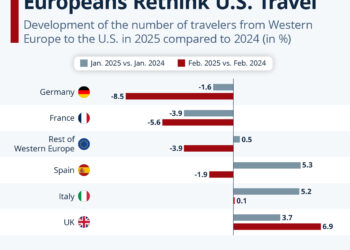Kennet Brask, a Danish traveler, fondly recalls his fishing adventure in Florida two years prior and intended to revisit this year. However, after witnessing an intense meeting between former President Donald Trump and Volodymyr Zelenskyy at the White House, he decided to cancel his trip.
“After watching that meeting, I told myself, ‘I won’t set foot in the United States as long as Mr. Trump is in office,'” Brask shared with Reuters, expressing his disbelief at Trump’s behavior, which he described as “rude” and unprofessional.
As an alternative, he has chosen to travel to Mexico instead.
Brask is not alone; many travelers from Denmark, Germany, and other European nations are reconsidering their travel plans due to Trump’s actions, as reported by several European travel agents.
In just two months, Trump has disrupted the long-standing US-Europe alliance, suggested the US should acquire Greenland, initiated a global trade conflict, and enforced more stringent border regulations, including stricter visa checks and a crackdown on undocumented migrants in America.
European tourists spent approximately $155 billion on travel to the United States in 2023. Yet, recent data from the US National Travel and Tourism Office indicates a 1% decrease in visitor arrivals from Western Europe in February, contrasting with a 14% increase during the same month the previous year. This decline was notably driven by a 26% drop in travelers from Slovenia, followed by reductions from Switzerland and Belgium.
Trump’s remarks regarding Greenland, which is a self-governing territory of Denmark, have struck a particularly sensitive chord among Danes. Kim Kugel Sorenson, another Dane, disclosed to Reuters that he canceled plans to attend a family friend’s wedding in California and even modified a tattoo by removing American symbols to avoid appearing pro-American.
According to NTTO data, arrivals from Denmark to the United States decreased by 6% in February, after a 7% rise in the same month the previous year.
Travel agents and data firms in Europe reported a noticeable decline in online searches for trips to the US, prompting them to concentrate their marketing efforts on alternative destinations.
“We have made a conscious choice not to invest in any marketing for USA tours due to the current political climate and the lack of interest from clients,” stated Steen Albrechtsen, a senior product manager at Albatros Travel based in Copenhagen.
International visitors tend to spend seven to eight times more than domestic travelers, as noted by the US Travel Association.
While the stronger dollar—initially rising before Trump’s inauguration but recently declining—and a sluggish European economy may deter some from traveling to the US, travel agents believe that political turmoil is having the most significant impact.
Mirko Lalli, CEO of Data Appeal Company, remarked that there had been a sharp decrease in internet searches for flights to the US this month across France, Italy, and Spain; however, demand from Britain remains high.
A Shift Towards Canada
Notably, Germans are increasingly looking to Canada as an alternative destination, according to the travel agency America Unlimited.
In light of Trump’s insinuations about making Canada the 51st state, many Europeans view a vacation there as a gesture of solidarity.
“Canada is booming like never before,” remarked Timo Kohlenberg, CEO of America Unlimited.
This situation may prompt Canadians to choose Europe for their summer travels, avoiding the United States altogether.
Canadian bookings for European vacation rentals have surged by 32% from June to August year-over-year, according to short-term rental analytics company Key Data.
Nevertheless, some travel businesses, including Europe’s largest tour operator TUI, anticipate that the US market will remain stable, particularly for city visits and campervan tours.
“We expect more German travelers to vacation in the US than in 2024,” a TUI spokesperson conveyed to Reuters.
German arrivals to the US dipped by 9% year-on-year in February, following an 18% increase during the same month the previous year, as indicated by NTTO data.
Additionally, both Britain and Germany have updated their travel advisories for citizens visiting the US, emphasizing new entry regulations. Germany’s foreign ministry is watching for any changes in US immigration policies following the detainment of three German nationals.
Maria del Carmen Ramos, an immigration attorney and partner at Shumaker, Loop & Kendrick, LLP, noted that individuals arriving at US borders are experiencing heightened scrutiny, though border patrol agents have more discretion and authority than many might think.
“It feels a bit chaotic at the border, with no clear logic governing the process,” she stated.





